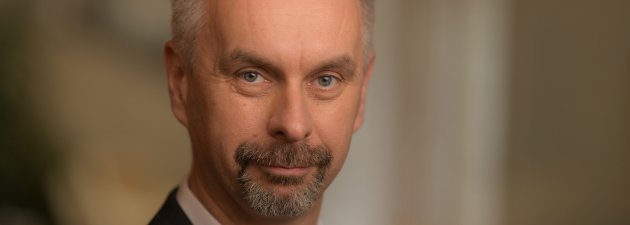Komerční banka (KB) economists conclude that the worst days are now over for the Czech economy and forecast an improved performance in 2024 after last year’s decline. However, the growth will be very moderate and won’t become more noticeable until the second half of the year. "Still, our country's economy has proven to be robust, and if we look at it as a whole, it’s like a big ship that can maintain a straight course even in rough seas. I am happy that our bank contributes to this with our stability and strength," says David Formánek, member of the KB board responsible for corporate and investment banking.
Your economists described the situation of the Czech economy as a characteristically sleepy start, as following the expected 0.4% decline in real GDP in 2023, the performance curve should be rising slowly this year, by 0.8%. Were the 2023 figures to some extent reflected in the behaviour of your corporate clients?
From our point of view, there was no crisis situation. We can see that in the risk costs, which reached an absolutely negligible level. However, increased caution was indeed typical of 2023 as a whole, and this trend was supported by economic stagnation. The investment appetite was lower particularly among medium-sized companies, as some of them have been struggling with higher energy prices. They were also dealing with changes in their business models, increasing staff costs, higher interest rates and so on. I believe that if 2024 brings positive incentives, as we expect, company investment activity will increase, which would in turn help the economy as a whole.
Sustainability and energy security are fundamental
In your view, what is the key prerequisite for a greater investment appetite of companies?
Everything revolves around energy. Having enough energy at a reasonable price is the foundation of prosperity and competitiveness in my view. The Czech Republic is one of the most industrialized countries in Europe, so this is a bigger issue for us than for other economies. I am glad that it was possible to reach a social consensus on nuclear energy and that our future energy mix should consist of nuclear energy combined with renewable sources, supplemented with gas as a transition medium, which can be later replaced by hydrogen for example. Getting there will require considerable amounts of money and complex projects that will span decades. In order to succeed, the crucial thing will therefore be to maintain continuity.
On the pages of TRADE NEWS, we inform readers about projects proving that your bank has long been very active in environmental protection and building energy security. Thanks to your unique know-how, you provide companies with complete services from consulting to sustainable financing.
Yes, thanks to the experts from our ENVIROS subsidiary, we are the only bank with such a comprehensive service package. We can advise entrepreneurs in ESG, energy and renewable resources, help them with subsidies and tendering, and overall set up a business activity that is sustainable in the long term. In this context, I always emphasize that it is not just about savings, but about seeking new innovative solutions and business opportunities. Massive changes await us in many sectors, and SMEs in particular can benefit from this situation.
Are they aware of that? Have you seen increased interest of companies in these services?
We have definitely noted a growing interest, which also has to do with companies getting ready for ESG reporting. Larger companies have been dealing with this for a long time, but what I’m really pleased about is that smaller companies that have not dealt with it in the past are becoming more and more interested in sustainability. We're increasingly seeing many of them embrace this trend as part of their new company philosophy, which is a great shift from previous years, when they may have felt pushed to the wall in this respect.
New technologies are an enabler
Almost a year ago, you started the new era of Komerční banka. The message was that of a major technological transformation, building a new bank for the third millennium. What have you achieved so far in this respect?
More than 200,000 of our individual clients are already using our new KB+ app, which is very state-of-the-art, fast and user-friendly. We are still working to enhance this solution and expect to offer the new era banking services to one million clients by the end of this year. At the same time, we started developing a new corporate bank, and this project will be ongoing over the next few years.
Our clients value two things the most at KB – the proficiency of our bank advisors and the brand.
Hopefully this won't mean the shift of corporate banking to a digital-only environment and the end of your banking advisors.
Definitely not. We regularly monitor satisfaction with our services, and this information clearly shows that our clients value two things the most at KB – the proficiency of our bank advisors and the brand.
However, in the future, I can imagine that new technologies and artificial intelligence will bring a completely new added value to our services. We live in a world of information overload. For our bank advisors, to point a corporate client in the right direction, to solve their problem or advise them on an investment, they must know the company well and above all, they must be familiar with the massive context of other related information. We are getting to a point where it is no longer within the bank advisors’ power to contain and evaluate everything – and this is where AI can help them a lot. If we can link it with our work processes in a meaningful way, the resulting service will bring enormous value to the client. It's still the future, but not a very distant one.
David Formánek was interviewed by Jana Jenšíková
Photo credits: KB


